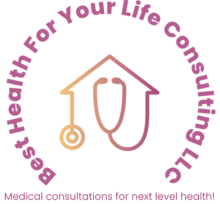Maintaining a lifestyle that keeps your heart healthy, is one of the most important things that you can do. Illnesses caused by cardiovascular diseases (diseases of the heart and the blood vessels that give blood to the various organs of the body) are the leading cause of illness and death in this country. These conditions cause more deaths than the most common cancers.
Maintaining mental health and wellbeing is the foundation for a healthy lifestyle. Lifestyle changes are easier when you have minimal stress. Try to maintain stable relationships at home and work. If you are having trouble coping with life issues, see your spiritual advisor or physician. A referral to a psychiatrist or counselor doesn’t mean you are “crazy”.
Your mental health is just as important as your physical health. Watch out for signs of depression (feeling hopeless, worthless, lack of energy, fatigue, less appetite, no interest in usual activities, irritability). Depression can severely limit your ability to concentrate on healthy living habits.

Regular exercise is the key to maintaining a healthy heart. Adequate exercise is any activity where you can get you heart rate up for at least 30 minutes, 3-5 times per week. Activities like walking and water aerobics are excellent ways to exercise.
Healthy eating habits can go a long way to prevent cardiovascular disease. Ask your doctor to refer you to a dietician for further education and to help reinforce your eating lifestyle changes
- Start every day with breakfast (not necessarily “breakfast food”). This habit can help give you energy throughout the day and prevent the feelings of hunger that limit your ability to choose healthy foods later on in the day.
- Eat 3-6 small meals per day. A meal can be as small as a piece of fruit or ½ of a sandwich. Healthy snacks prevent hunger and help you sustain energy for the day.
- Drink at least 8 glasses of water per day.
- Eat fresh, lean meats, like chicken, turkey and fish. Limit more fatty meats, like beef and duck. You should limit all salt-cured meats, like ham and cold cuts, like bologna and hot dogs.
- Limit your intake of salt (sodium). High sodium intake can increase blood pressure. High blood pressure damages blood vessels and organs. Sodium intake can be decreased by avoiding canned foods and processed boxed and microwaveable food products.
- Avoid all fried foods and fast foods. Low-fat food choices are now more available on many restaurant menus. Foods high in fat and cholesterol, like fried foods, high-fat snacks like chips, candy bars, pastries, cakes, pies and cheese, can raise your cholesterol levels and cause blockages in important arteries in the body.
- Eat no more than 3 eggs per week and limit the use of regular butter to avoid the high cholesterol content in these ingredients. Try low-fat versions of the foods you like. Drink reduced-fat milk (skim milk is best). Try rice and soy versions of the milk and dairy products that you like.
- Eat lots of vegetables. Eat more fresh fruit, instead of bottled juices and pop. Drink sugar-free beverages as much as possible.
- Cut down on bread and white potatoes.
- Avoid creamy sauces, dressings and gravy. These ingredients can add fat and many calories to an otherwise healthy meal.

By eating healthier and doing regular exercise, you can be more successful at getting rid of excess pounds. Normal weight loss is just 4-5 pounds per month. The slow, steady shedding of excess weight by using healthy eating and exercise is more likely to be permanent that using fad diets. Be patient and consistent with your weight loss routine.
The avoidance of tobacco cigarettes and alcohol is integral to a healthier lifestyle. All cardiovascular diseases are negatively affected by cigarette smoking and excess alcohol consumption.
Knowing your family history of diabetes, high blood pressure, strokes and kidney disease is important information to help your doctor assess your risk for cardiovascular disease. A family history of these diseases means increased chances that you may also get them as well. The most important family members to know about are your parents, children and siblings. Any disease that they may have can most directly affect you.
Remember not to ignore symptoms like chest pain, trouble breathing, frequent urination and other physical symptoms that are new and/or persistent. If there is something going on inside your body, it is better to find out what the problem is sooner, rather than later, when treatment may not be as effective.

You should schedule regular visits to the doctor to get your blood pressure, blood sugar and cholesterol checked. Maintain more frequent (at least every 3 months), regular contact with your physician to promote good control of your diabetes, high cholesterol and your high blood pressure, if you have these conditions already.
Disease control is the key to the prevention of the long term complications that can happen if these diseases remain uncontrolled. The prevention of various conditions like heart attack, stroke, high blood pressure, diabetes and kidney disease can be initiated by consistent lifestyle changes.

